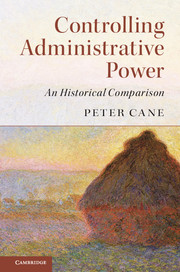Book contents
- Frontmatter
- Dedication
- Contents
- Preface
- Table of cases
- Table of legislation
- 1 Introduction: concepts and methodology
- 2 The English system of government
- 3 The US system of government
- 4 The Australian system of government
- 5 The development and institutional structure of control regimes
- 6 Administrative interpretation
- 7 Administrative fact-finding and policy-making
- 8 Administrative rule-making
- 9 Administrative adjudication
- 10 Private law controls
- 11 Controlling information
- 12 The New PublicManagement
- 13 Controlling the controllers
- 14 Concluding reflections on methodology and themes
- Bibliography
- Index
Preface
Published online by Cambridge University Press: 05 March 2016
- Frontmatter
- Dedication
- Contents
- Preface
- Table of cases
- Table of legislation
- 1 Introduction: concepts and methodology
- 2 The English system of government
- 3 The US system of government
- 4 The Australian system of government
- 5 The development and institutional structure of control regimes
- 6 Administrative interpretation
- 7 Administrative fact-finding and policy-making
- 8 Administrative rule-making
- 9 Administrative adjudication
- 10 Private law controls
- 11 Controlling information
- 12 The New PublicManagement
- 13 Controlling the controllers
- 14 Concluding reflections on methodology and themes
- Bibliography
- Index
Summary
If all you have is a hammer, everything looks like a nail.
(Abraham Maslow)The research reported in this book (which was significantly funded by the Australian Research Council) was originally conceived to provide an account of administrative law as a normative framework for public administration. However, once I started reading more widely and deeply into the topic, I began to think that it would be more interesting and fruitful to reverse the order and explore the idea of public administration as the institutional framework or context of administrative law. The next step in my mind was to broaden focus from administrative law to arrangements more generally for controlling the conduct of public administration and the exercise of public administrative power. By this line of thinking I finally arrived at the topic of this book, namely, the institutional and constitutional framework or foundations of what I call ‘control regimes’, by which I mean sets of institutions, norms and practices concerned with controlling public administrative power.
Framed at a high level of abstraction, my basic thesis is that similarities and differences between control regimes may be partly explicable by similarities and differences between what I call ‘systems of government’. A system of government, in my account, is a set of institutions, norms and practices concerned with the allocation and distribution of public power, including administrative power. At one level, I present this proposition as an hypothesis to be tested. However, the further I progressed with the project the more I came to realise that it resembled Maslow's hammer. In the end, therefore, it may be more productive to think of the thesis as an idée fixe or a trope that is apt to illuminate a very complex set of social phenomena rather than to identify connections – least of all causal connections – between systems of government and control regimes. Whether or not my approach will resonate with any particular reader will, no doubt, depend largely on that reader's knowledge of and perspective on the social phenomena and the various societies dealt with in the analysis. Put differently, this book can be read as a series of stories, based on my observations about systems of government and control regimes, which result from the reading and thinking about these matters that I have undertaken most intensively in the past few years but more generally since the late 1970s.
- Type
- Chapter
- Information
- Controlling Administrative PowerAn Historical Comparison, pp. xiii - xvPublisher: Cambridge University PressPrint publication year: 2016
- 1
- Cited by



